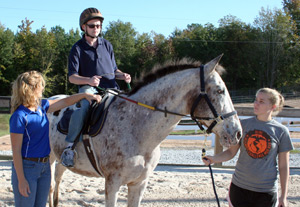
When Semi retired, he found out that he wasn't being "put out to pasture," at least not entirely. Semi is one of more than two dozen horses at Lander University's Equestrian Center in Greenwood and, like many humans, he is proving that retirement can be a busy and fruitful experience.
Semi, whose full name is Seminole Wind, is a 22-year-old Appaloosa whose age is about equal to 65 in humans. His previous owner, Margaret Donahue, an attorney who lives and works in Columbia, donated him to Lander to be used in the Equestrian Center's therapeutic riding program.
Donahue said she obtained Semi in 1992, about three months after she began taking riding lessons. She and her father trained him to be a jumper and it soon became evident that jumping was his calling. Donahue said, "The horse we never expected to be anything more than a local show kids horse, ended up showing in jumper divisions at A-rated shows, and he was very tough to beat." In 1999, he was the American Horse Show Association's Zone 4 Adult Jumper Reserve Champion of the Year.
Later, the Donahues would use Semi to teach friends to ride. "He has quite the fan club of students over the years," she said.
Donahue majored in equine business management at St. Andrews Presbyterian College in North Carolina and was a member of its Intercollegiate Horse Show Association (IHSA) and American National Riding Commission teams. After graduation, she also rode in the IHSA Alumni division and competed in the national finals twice. She also coached the equestrian team at the University of South Carolina, where she earned her law degree.
Donahue said during his career, Semi was a versatile competitor, showing in many different classes, including jumpers.
As the horse aged, she recognized that he needed a reduced level of activity to maintain his health and knew he would not be satisfied to spend most of his time in a pasture without daily interaction with people. "He loves attention," she said.
Donahue believed he would be an excellent fit in a therapeutic riding program because of his temperament.
She donated Semi to Lander's Equestrian Center in August of 2010 after getting to know Lander's equestrian team coach Mary Hughston-Weaver through their involvement in IHSA events. She said, "I knew Mary would set a top-rate standard of care for Lander's horses, and felt the quality of Lander's therapeutic riding program would be far better as a teaching facility than other therapeutic riding groups." She added, "Semi has done so much for me that his happiness is a top priority."
According to Beth Wood, Lander's therapeutic riding coordinator, all the horses used in the program are put through a series of tests to ensure their suitability as mounts for people with disabilities and special needs. She said they have to be smart, must have the right temperament and be able to tolerate riders who are unbalanced while, at the same time, being led by a handler and flanked by side walkers.
Horses who are in their early teens or older are usually more suited for the program because they have experienced a variety of riding activities and are accustomed to being around other horses. "They are not easily unnerved and are adaptable to a different environment," said Wood. Once they are found to be suitable, the horses are slowly introduced to the therapeutic riding program and its clients. As for Semi, Wood said, "He is a wonderful therapy horse."
Those who know and work with Semi are gratified that he is as successful in his second career in therapeutic horsemanship as he was when he was winning awards in competitive horse show events.
When he and Lander's other therapy horses aren't working with special needs clients, they are given plenty of opportunities to spend time grazing and are taken on more relaxing trail rides with able-bodied riders. Wood said, "We want to let the horses do something fun."